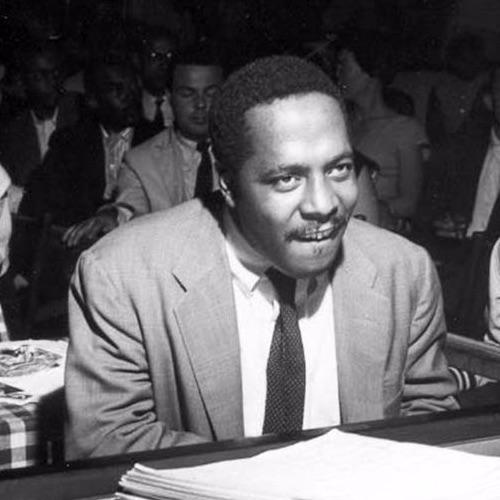Bud Powell
 USAJazz, Bebop
USAJazz, Bebop

 USAJazz, Bebop
USAJazz, BebopAmerican jazz pianist and composer Bud Powell was a master of his craft. He was a key figure in the growth of bebop music, having contributed significantly to its development in the 1940s. Powell's virtuoso technique, creative improvisations, and harmonic innovations that were thought to be ground-breaking at the time defined his style. His playing was frequently characterized as energetic, and he stood out from other pianists of his time with his unique use of rhythm and phrasing.
Powell's performances were infused with a sense of urgency and passion that was evident in his very emotional compositions. His command of the instrument and his thorough knowledge of the songs he played were evident in his ability to transmit such raw emotion via his playing. Powell had a big impact on the jazz scene, and many players credit him with having a substantial influence on their own playing. Despite Powell's tragically brief life, his music and influence on the jazz community continue to carry on his legacy.
A jazz and bebop musician from New York, USA, named Bud Powell has made a significant contribution to jazz music history. His top songs include "A Night In Tunisia," "Un Poco Loco," and "Cheryl," and they have all inspired both musicians and listeners. These songs exhibit Powell's distinctive sound and style, which were highlighted by his lightning-quick runs, intricate chord progressions, and creative use of harmony.
Another well-liked song by Powell is "Polka Dots And Moonbeams - Remastered," which has a catchy tune and Powell's distinctive piano playing style. Another standout piece is "Blues In The Closet," which demonstrates Powell's improvisational prowess and his capacity to conjure intricate melody lines on the fly.
Some of Powell's most well-known songs are "You Go to My Head - 2000 Remastered Version", "You Go to My Head", "Cleopatra's Dream - Remastered 2003/Rudy Van Gelder Edition", and "I Should Care - 2000 Remastered Version". These songs all display Powell's distinctive tone and style as well as his talent for crafting rich and complex melodies that are both lovely and entrancing.
Overall, Bud Powell's music continues to inspire and have an impact on both musicians and listeners, and his legacy will endure for many years to come.
One of New York's most well-known jazz and bebop players, Bud Powell, has recently put out some wonderful work. His most recent recording, "Piano Jazz: Bud Powell (2023)," displays both his individual style and piano prowess. He gives some of his best performances on the CD, including "Bud's Bubble," "Parisian Thoroughfare," and "Tempus Fugit." The rich melodies and fluctuating tempos in Powell's work are renowned for keeping the listener interested throughout.
Along with his most recent album, Powell has also put out some excellent singles. Thanks to its energetic speed and memorable tune, "Honky Tonk Nights (2009)" stands out as a highlight track. "Don't Break My Heart (2008)," another excellent hit, is a prime example of Powell's talent for writing lovely, moving tunes. Of course, no discussion of Bud Powell's music would be complete without bringing up "Piano (1950)," a well-known work that showcases his tremendous talent and his capacity for composing beautiful harmonies.
Overall, listeners all over the world are enthralled with Bud Powell's music. His most recent album and singles are evidence of his outstanding talent and his long impact in the jazz and bebop music genres. The beauty and complexity of his works will surely wow you, whether you've been a fan for a while or are just discovering him.
The renowned jazz pianist and composer from New York City, Bud Powell, made several noteworthy appearances at different events and places. At the Copenhagen Jazz Festival, he shared the stage with jazz greats Dexter Gordon and Kenny Drew in one of his most memorable performances. At this festival, Powell performed, showcasing his distinctive and creative approach to bebop music, which helped him become one of the most important jazz performers of his day.
Bud Powell performed not only at the Copenhagen Jazz Festival but also at other illustrious gatherings and events, including the Newport Jazz Festival and the Village Vanguard in New York City. Powell's inventive compositions and superb piano playing wowed listeners throughout these performances, inspiring other musicians to pursue other creative horizons.
Despite facing personal and physical challenges throughout his career, Bud Powell's music has had a lasting impact on jazz performers. Numerous musicians who have followed in his footsteps and continue to push the boundaries of jazz and bebop music reflect his influence in their work.
Bud Powell worked with a number of well-known jazz and bebop musicians, such as Don Byas, Max Roach, Charlie Parker, and Dizzy Gillespie. The songs "Perdido," "Hot House," and "Wee (A.K.A. Allen's Alley)" with Parker, Gillespie, and Roach stand out the most among these collaborations. These songs, which also feature Powell's excellent piano playing, demonstrate the high level of musicianship and improvisational skills possessed by all the performers.
In particular, "Perdido" showcases Powell's piano and Parker's saxophone in a dynamic and nuanced interplay, with Roach's drumming providing a pulsating rhythm. The song is a bebop music classic because of its peppy tempo and recognizable tune. The piano runs Powell can play on "Hot House" and "Wee (A.K.A. Allen's Alley)" are similarly quick and intricate, matching the dexterity of Parker and Gillespie's solos.
Another noteworthy collaboration is Powell and Don Byas' rendition of "Cherokee." Although this tune is not as well-known as the Parker/Gillespie/Roach trio albums, Powell still shows his ability to play with other excellent players and add to a well-rounded sound. Powell's piano playing and Byas's saxophone playing work well together to provide a lively and engrossing performance.
Overall, Bud Powell's associations with other jazz and bebop performers had a crucial role in the evolution of these musical styles and are still hailed as some of the best examples of improvisational music.